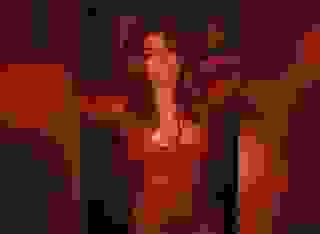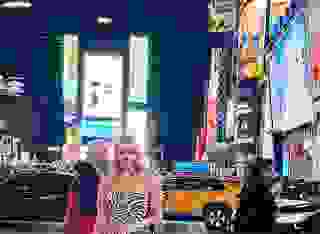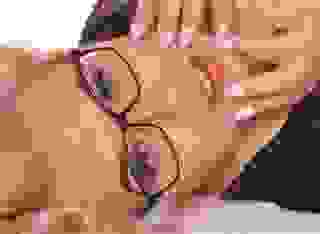- Novels and Novellas
- Maragana Girl P.S. 03
Note: You can change font size, font face, and turn on dark mode by clicking the "A" icon tab in the Story Info Box.
You can temporarily switch back to a Classic Literotica® experience during our ongoing public Beta testing. Please consider leaving feedback on issues you experience or suggest improvements.
Click herePostscript 3 - The Danubian Church and its impact on Danubian society
(even more stuff that did not make it into the main part of the novel)
The Danubian concept of the Supreme Being
The Danubians have a monotheistic religion, which they refer to as the "Danubian Church" or the "Faith of the Ancients". Although in theory the Danubians are Christian, by the end of the 20th Century the majority of what they believed came from ideas that predated the country's official conversion to Christianity in 850 AD.
The Danubians refer to God as "The Creator". Before everything, even before time, light, and matter, there was the Creator. The Creator is much greater than human comprehension and, unlike the Judeo-Christian God, does not have any human characteristics such as anger. To attempt to apply earthly traits to the Creator such as names, emotion, or gender, is considered a serious insult to the Danubian deity, because human traits are limitations that are restricted to "the physical Earth". However, because the Creator intended for humans to inhabit the Physical Earth, the Creator cares about the well-being of humans and will respond to prayer and public penance.
Opposite of "The Creator" is "The Destroyer". The relationship between the Creator and the Destroyer is somewhat similar to the relationship between Judeo-Christian God and Satan, but there are significant differences. The Danubian religion teaches that in the Physical World creation cannot exist without destruction, just as life cannot exist without death. The Destroyer brings death to the world, which is necessary to make room for new life. Danubians are not taught to hate the Destroyer, because destruction is an integral and necessary part of the Cosmos. However they deeply fear the suffering that the Destroyer is capable of inflicting and seek deliverance through prayer, public penance, and visions. Only the Creator can grant a living entity or an inanimate object (such as a Temple) protection from the Destroyer.
Both the Creator and the Destroyer communicate through visions. The Danubian Church believes that visions are what connect the Spiritual World to the Physical World and what give believers guidance to illuminate the Path of Life. An undamaged soul, healthy body, and accurate knowledge of the world are crucial to having truthful visions. A person that is knowledgeable about the world and has good intentions will enjoy visions granted by the Creator. A person blessed with a vision from the Creator is obligated to act on that vision, but often will seek assistance from a member of the Clergy to interpret its meaning and make sure it is indeed a vision from the Creator, and not a false one from the Destroyer.
An ignorant person or a person with an unhealthy body or damaged soul also can have visions, but those will be false images from the Destroyer. For example, a national leader with a damaged soul might receive a vision of glory, wealth, and power that would prompt him to lead his country to war. The false vision of a glorious war, if enacted, will bring suffering and destruction to the nation and disgrace and death to the leader. The Danubians often cite the rise and fall of Adolf Hitler the best example of a damaged soul with earthly power who received and acted upon false visions from the Destroyer. The CEO's from Mega-Town Associates and their ambition to seize Upper Danubia's forests for financial gain is another example of damaged souls in pursuit of a false vision.
The Creator and the Destroyer co-exist and counter-balance each other in the Physical World, but the Destroyer has no presence in the Spiritual World. All souls, both good (whole) and evil (damaged), travel to the Realm of the Creator upon death (which Danubians refer to as "the release of the body"). Upon entering the Realm of the Creator, human souls surrender their physical bodies back to the Earth and are forever liberated from the influences of the Destroyer.
The Danubian concept of the Afterlife
The Danubian Clergy does not claim to have an accurate idea about the specific conditions facing souls in the Afterlife. However, upon separation from their earthly bodies, all souls enter a single place, the Realm of the Creator. There is no separating of "saved" and "condemned" souls, nor is there any concept of a separate Heaven and Hell. Thus the Danubian Church avoids the theological problem of attempting to specify what exactly qualifies a soul to enter Heaven.
Upon facing the Creator all souls must come to terms with the consequences of their behavior in the Physical World. The ancient Danubian scriptures mention that the Realm of the Creator also is the Realm of Absolute Truth. In the Afterlife all the Earth's secrets are revealed, all mysteries resolved, and all questions asked throughout life answered. To fully comprehend the way he was during the Physical Life, every follower of the Danubian Church is buried with a special mirror provided by the Temple. Upon separation from the physical body, the human soul holds the mirror up to the Creator, and every action from his life is reflected back as part of the soul's exposure to the Absolute Truth. Each person sees himself for what he truly was during his sojourn in the material world, because a person's Afterlife is a reflection of his physical life on Earth. In the Afterlife every soul must face the consequences, both good and evil, of every action taken while in possession of a body in the Physical World. Danubians assume that a person who followed the will of the Creator will enjoy a more pleasant Afterlife than one who lived in defiance of the Creator. However, what that actually means is determined by the Creator and is beyond human comprehension.
Two Worlds, Holy Sites, and the purpose of Death Marches
The Danubians do not believe in ghosts, but they believe that souls exposed to the Absolute Truth periodically get permission from the Creator to travel back to the Physical World and communicate to the living through visions. Usually such communication is very difficult, but there are special ancient places, such as the Sacred Ground of the Guardian Spirits behind Danube City's Temple of the Ancients, where the Spiritual World is more closely connected to the Physical World and the dead more easily can communicate with the living. Living Danubians are eager to receive visions and guidance from the dead, so they frequently make pilgrimages to Holy Sites to pray for enlightenment that can guide their actions in the Physical World.
For a Danubian seeking divine guidance, even more important than visiting Holy Sites is the annual Fall Equinox Festival, or the Day of the Dead. The Fall Equinox, the day the Northern Hemisphere begins its journey into the depths of winter, is when the channels of communication between the Spiritual and Physical Worlds are much stronger than at any other time of the year. The long death of winter is rapidly descending over Danubia, so during the country's passage into cold and darkness people must reflect on what it means to still be alive and part of the Physical World.
During the Day of the Dead, the Danubian Church calls upon the most humble and suffering members of society, convicted criminals and persons performing public penance, to offer their bodies to allow the dead to re-enter the Physical World and communicate with worshipers. The offering of the humble is done through a two-night torchlight procession. In ancient times slaves marched as well, but formal slavery was abolished after the country's official conversion to Christianity.
The Danubian world-view and other religions
The Danubian Church does not claim to be a universalistic religion and there is no systematic effort or desire to convert non-Danubians. The Danubians are aware that their religion only exists within the borders of a single country and are able to accept that fact as the will of the Creator. Instead, what the Danubian Clergy believes is that the Physical World and the Spiritual World are separated, but in the Danubian territory the separation between the two worlds is much less than it is anywhere else. Because the rest of the Physical World suffers from a greater degree of separation from the Realm of Absolute Truth, the Creator allowed other religions to arise outside the Danubian nation. Why that should be is a question Danubian Clergy members do not pretend to understand.
There is no perceived calling for the Danubians to try to change the minds or faith of outsiders. If an outsider becomes interested in the Danubian Church and wants to convert and practice the Danubian religion, the Clergy will educate that person in ancient scripture and accept him into the Church. Normally an outsider wishing to join the Danubian Church needs to prove his determination by performing public penance before he can be accepted as a full member. Kimberly Lee's sister Cynthia performed public penance and converted the year after Kim and Sergekt got married and subsequently returned to her home in the United States, for example. However, the Path of her Life was to safeguard the Land of the Ancients. Just a few months after converting she fullfilled her Path in Life by returning to Danubia with the information Vladim Dukov needed to counter the Mega-Town coup that was provided by Jason Schmidt. Once that task was completed, the Creator forced her to permanently settle among her fellow believers and live out her physical life in Danubia.
Freedom of religion is not a part of Danubian culture and there is no tolerance for other faiths within the nation's territory. All Danubians, even the most liberal and educated, agree that outside religions have no place in the Duchy. Foreign missionaries and proselytizing are strictly prohibited and punishable with 10-year sentences. Any Danubian converting to another religion must leave the country to practice it.
The Danubian Church and scientific discovery
Unlike Judeo-Christianity, the Danubian faith does not have a detailed "Creation Story" for the Physical World. The Danubians believe that the Creator made and fine-tuned the Physical Earth long before the first humans arrived to inhabit it. The Danubians never attempted to guess how old the Earth was or how long it took to create, because such knowledge was considered "the divine secret of the Creator and part of the Absolute Truth". To speculate about the age of the Physical Earth without any evidence would have been considered sin.
When fossils were discovered and the Theory of Evolution appeared during the 19th Century to challenge Christian concepts about the Earth's creation, the Danubian Church was the only religion that did not see evolution as a threat to its core beliefs. The Clergy already accepted that the Earth had existed long before the first people and that the Creator had spent many years preparing the Physical World for human habitation. The Clergy viewed evolution not as a threat to their faith, but instead as a possible explanation of how that ancient process might have taken place and the method by which the Creator prepared the planet. Even extinction made sense to the Danubian Clergy, because the death of species fit nicely with the concept of oblivion brought about by the Destroyer.
As more information about the Earth's pre-human past became common knowledge though scientific discovery, the Danubian Clergy accepted it with total enthusiasm. It turned out that through revealing fossils to humans, the Creator was blessing the world with a portion of the Absolute Truth. The Creator had shown confidence in people by granting them knowledge of a time that was outside the human experience, but apparently not beyond human comprehension.
During the late 20th Century the Danubians became much more certain about their religious beliefs while the rest of Europe lost its faith in the supernatural. As scientific discovery undermined the creation accounts of other religions, the Danubians were convinced that their own view of the Cosmos and the relationship between humans, the passage of time, and the Physical World had been vindicated.
Yes indeed, the Earth is much older than humans and took a very long time to create. Yes, the planet's violent history proves that the Creator and the Destroyer fiercely fought each other while destroying and recreating the world into what we see today. To think...we now have proof that the Destroyer wiped out entire continents with ice sheets, and floods, and volcanic eruptions, and even struck down the planet with meteors, but the Creator always restored the planet and restored life... Yes, that's what we've been saying all along...
The Danubian Church and the sanctity of the human body
Proper custodianship of the human body is central to Danubian theology. The Danubian Church teaches that every human being consists of a soul, which is immortal, and a physical body, which is a gift temporarily provided to each soul by the Creator. The human body is the Creator's covenant with the Earth, lent to allow human souls to travel through the Physical World and interact with other human souls. Because each body is "on loan" from the Creator, it is the sacred obligation of every person to care for his or her body as carefully as possible.
The Danubian belief in the sanctity of the human body is important for understanding how Danubians live their daily lives. Physical health is a moral obligation, so Danubians are careful to exercise and eat nutritious food. To eat unhealthy food purely for the pleasure of taste is considered sin. For example, junk food is not available in the Danubian Republic, because eating non-nutritious items that damage the body is considered an offense against the Creator. Mistreatment of the human body also is the reason why the use of intoxicants is so savagely condemned by the Danubian clergy. The idea of injecting oneself with heroin, smoking meth, or snorting cocaine horrifies the average Danubian.
The same harsh judgment applies to lifestyles that allow the premature deterioration of the body, such as the American "couch potato". Likewise, foreign practices such as tattoos, cosmetic surgery, and piercing for jewelry are considered acts of vandalism against the body, which ultimately is the property of the Creator. The only surgery permitted in the country is what is needed to safeguard or enhance a person's health. The prohibition against altering the body for the purpose of vanity extends to dyeing hair and using make-up. If the Creator gave a woman brown hair for example, for her to change the color to blond would be considered an act of defiance and overt rejection of the Creator's gift to her soul. Equally abhorrent to Danubians are religious practices of other faiths such as self-flagellation and fasting that inflict lasting damage on the Creator's gift to the soul. During the Middle Ages aversion to Roman Catholic penance rites became a major source of conflict between the Danubian Clergy and the Vatican.
Danubian religion teaches that the only purpose of clothing is to protect the body from injury or physical discomfort. The Creator gave humans the knowledge to create clothing to help people shield their bodies from the harsh conditions of winter. To wear clothing for any other purpose is considered vanity and an act of sin. Especially sinful is to wear clothing that alters the body's appearance or causes physical discomfort, examples being items such as corsets or high-healed shoes.
The Danubian Clergy teaches that the fashion industry is nothing more than the Destroyer's effort to encourage humans to deface and reject the Creator's gift to the soul. Danubians refer to the emphasis that foreigners place on clothing as "the evil worship of cloth". Seekers of wealth have brainwashed the public to venerate clothing instead of the human body, and in doing so have created a sinful culture that requires people to pour large amounts of money into material possessions for the sake of public approval.
The Danubian Church and law enforcement
Many outsiders and critics of Danubian society perceive a contradiction between the Danubian Church's attitude towards caring for the physical body and the government's use of corporal punishment to discipline convicted criminals. For the Church there is no such contradiction, because the religion considers physical pain, prolonged exposure, and public humiliation as necessary to re-orient a damaged soul and give the criminal the opportunity to find the Correct Path in Life. Upon conviction, the criminal progresses through the shock of the initial punishment to a period of prolonged suffering. From suffering the criminal experiences remorse, and from remorse the criminal can reflect on the consequences of having a damaged soul and acting on the false ideas promoted by the Destroyer. From that point the criminal is ready to seek redemption and re-enter society as a normal citizen. Both the Church and the government argue that unless a criminal undergoes intense trial and suffering, he will never feel compelled to ask the Creator for redemption and change his Path in Life.
The lives of Danubian Priests and Priestesses
Danubian clergy members are well-educated. In modern times to become a Clergy member an aspirant must graduate from high school and master all academic subjects before starting Seminary. Apart from Biblical Studies, Scriptural Studies, and theology, Danubian seminary instructors teach history, writing skills and oratory, psychology and counseling, social sciences and economics, comparative religions, and the fundamentals of Danubian criminal law. Apart from the academic topics, Seminary students need to become fluent in archaic Danubian and are required to memorize ancient Danubian religious writings. A prospective clergy member must understand the past and be able visualize how people lived throughout history.
Danubian clergy members take a vow of poverty upon entering the Seminary. Seminary students, men and women alike, own nothing but a single black prayer robe, which must last the entire four-year program. If the robe wears out or is damaged, the Seminary student may not replace it. If a Seminary student's robe cannot be worn anymore, that student must remain naked throughout the remainder of his or her studies. To avoid unnecessary wear and tear on their prayer robes, Seminary students routinely perform Public Penance during the warmer parts of the year. Upon swearing in, new Priests and Priestesses burn their Seminary clothing and are issued Temple garments; black robes for men and black dresses for women. Clergy members must wear their garments at all times when in public. Unlike the prayer robe of Seminary students, the outfits of Clergy members must be replaced whenever they show signs of wear and tear. However, a Priest or Priestess may only be issued one outfit at a time. At no time may a member of the Danubian Clergy wear any clothing other than the official religious garment.
Members of the Danubian Clergy do not practice celibacy. In fact, to become a full member of the Clergy, a Seminary student is first required to find a "proper partner" of the opposite sex. Priests and Priestesses marry each other, normally serve together in the same Temple, and bear children to set an example of haráshkt jettít. Younger children live in the Priests' quarters with their parents, while older children live with relatives. To prevent nepotism and hereditary privileges, the first generation of children of Clergy members are not allowed to follow their parents into the priesthood.
Support from family members is important for Priests and Priestesses to properly perform their duties. When a person becomes a Priest or Priestess, the Church expects the family to support the Clergy member with meals, child rearing, and the few material needs he or she might have throughout life. Usually that is not a problem because any household that has a Priest or Priestess as a member is honored and considered blessed by the Creator. The school-aged children of Clergy members normally live with relatives. Also, because food is not allowed in any Danubian holy site, Priests and Priestesses normally eat at the houses of the relatives that are taking care of their children, but must return to the Temple to sleep.








